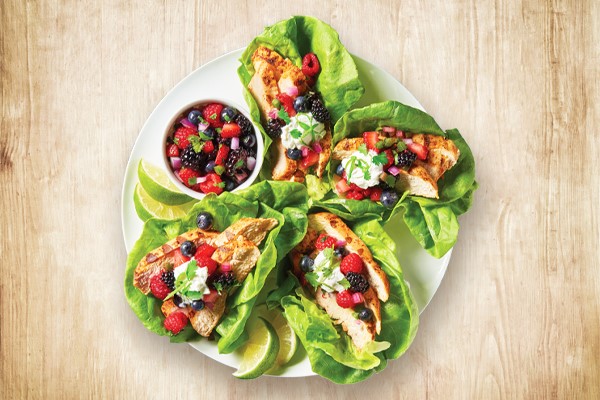Description
Healthy skin isn't just about what you put on it, it's also about what you feed it. Learn about the vitamins and nutrients that promote healthy skin, and fill your cart with everything you need to make these easy summer recipes to look and feel your best.
Spinach
Spinach and other leafy greens, along with cantaloupe, carrots, pumpkin, red bell pepper, squash, sweet potatoes, and tomatoes, have vitamin A. This key nutrient plays an important role in repairing skin tissue and replacing cells that contribute to the structure of the skin. It also helps prevent dry, rough skin, which may be a sign of deficiency.
Berries
Frozen or fresh berries, along with Brussels sprouts, citrus, bell peppers, and kiwi contain vitamin C. This powerful antioxidant helps protect skin cells by warding off harmful free radicals from UV rays. It's also necessary for wound healing and collagen synthesis.
Hyvee Dietitian Expert Tip
The best way to meet your daily vitamin requirements is by eating whole foods. There are 13 known vitamins in varying amounts in different foods, so it's important to eat a variety of fruits, vegetables, proteins, and grains.Lean Meat
Lean meats such as chicken breasts, fish, and ground turkey, along with beans, chickpeas, eggs, Greek yogurt, legumes (such as lentils), nuts, and whole grains are a good source of protein. Collagen is a type of protein that makes up to 80 percent of the skin and helps fend off fine lines and wrinkles. Protein-rich foods may encourage collagen production, and many contain B vitamins, like biotin, which forms the basis of skin, and pantothenic acid (vitamin B5), which preserves moisture and may help prevent acne.
Also check out 5 Foods That Promote Natural Collagen Production.
Almonds
Almonds, asparagus, avocado, collard greens, mango, peanuts pumpkin, red bell pepper, and spinach all contain vitamin E, a nutrient that absorbs energy from UV light and helps prevent sun damage. Vitamin E may also play an anti-inflammatory role in the skin.
Water
Skin that's dehydrated may turn dry, tight, and flaky. According to research, diets with a high water intake lead to a positive impact on skin physiology, most profoundly among individuals who previously had lower water intake.
Salmon
Salmon and other fatty fish, such as mackerel and sardines, along with flaxseeds, chia seeds, and walnuts contain omega-3 fatty acids. These fats are critical for maintaining skin function and appearance. They also protect against sun-induced damage and aging. According to a study from the University of Manchester, omega-3 fish oil supplements may help prevent skin cancer.
Also check out, Fish Oil Supplements: Are They Worth It?


